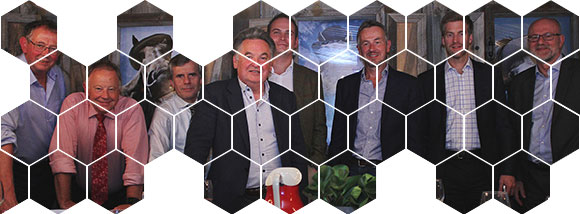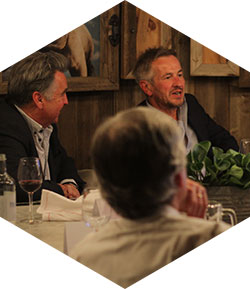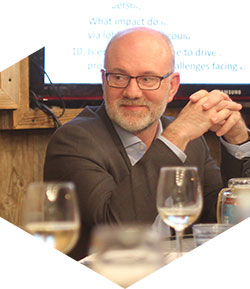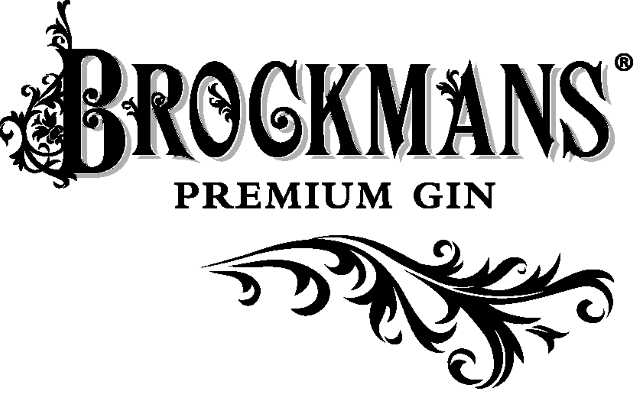The impact of trade bodies on the drinks sector

“In an era of consolidation in the drinks industry, what role do support bodies play in sustaining large and small drinks companies?”
In the latest Cesium Group Thought Leadership event, key drinks trade figures came together to discuss the role of trade and educational bodies and their support for drinks businesses.
The Riding House Café, London W1W

ATTENDEES (pictured L to R)
- Chris Foss, head of Wine Department, Plumpton College
- Ian Harris, chief executive, WSET
- Geoff Strawbridge, regional director, CAMRA
- David Martin, consultant, The Business of Drinks
- Paul Haslam, managing director, The Cesium Group
- Chris Mace, principal consultant, OE practice, The Cesium Group
- Henry Ashworth, chief executive, The Portman Group
- Jerry Avis, chief executive, Institute of Brewing and Distilling
INTRODUCTION
THE SUCCESS or failure of a drinks brand is determined by many things – the quality of the product, the consistency of delivery, effective marketing, a favourable trading environment.
But drinks companies do not exist in a vacuum, and require the involvement of a host of ancillary organisations to nurture and guide them, and to make the wider industry healthy and prosperous.
T he Cesium Thought Leadership panel this month sought to understand the role such organisations play in shaping the drinks industry – identifying who they are, what purpose they serve, how effective they are, what their limitations are and how they can set the agenda. The panel – comprising representatives from the technical end of drinks, from professional and educational bodies to specialists in drinks-business consultancy and social responsibility – first addressed whether these disparate organisations can work in a coordinated way.
he Cesium Thought Leadership panel this month sought to understand the role such organisations play in shaping the drinks industry – identifying who they are, what purpose they serve, how effective they are, what their limitations are and how they can set the agenda. The panel – comprising representatives from the technical end of drinks, from professional and educational bodies to specialists in drinks-business consultancy and social responsibility – first addressed whether these disparate organisations can work in a coordinated way.
While one panellist highlighted the positive relationships that existed between technical bodies and other drinks-trade organisations, saying “every organisation occupies a very clear sector”, another, who works on the regulatory side of the trade, had a contrasting view.
“I work with many organisations that interface with government and the greatest challenge is not tripping over each other with our interactions” he said. “There are organisations that seem to want to divide the industry, and organisations that try bring it together. A unified industry voice is in the interests of wider society, and Government… I find the many overlaps counter-productive, and they are confusing for Government. This can result in poor policy”
EDUCATION
From the educational side, the outlook appeared more positive. One commenter said educational bodies did not suffer the same problems as lobbyists, who had to present a united front to government when the reality was often one of diverging priorities.
“We don’t have this conflict that the lobbyists do, which must be incredibly frustrating – trying to pull together one voice to make government view us as a good thing, rather than, say, tobacco or sugar”
“Our main focus is the students. We develop them as individuals, not just technically. We help them on their road to self-realisation, to achieve their goals. People come to us and they become successful winemakers. We supply people to the industry but the crux of the matter is working with people and helping them be their best.”
The group did identify a gap in the provision of education, especially for small and medium sized businesses – realising that they would be more successful as they grow if they invested a little more in leadership/management education; often they don’t see the v alue until it is too late and the supporting organisations rarely provide this.
alue until it is too late and the supporting organisations rarely provide this.
INTERDEPENDENCY
The panel discussed the ways in which the drinks market is changing.
In an era of consolidation in the drinks trade, have industry bodies been able to engage with businesses at different stages of their growth journey with different challenges? “This is a key question,” said one panellist, emphasising the need for larger and smaller players to understand their interdependency, which industry bodies ought not to obscure.
 “It comes back to your market – that covers everything from an enormous company to a small business trying to break through. It’s got to be the market leaders that are supporting and funding the growth of the industry as a whole. I suppose the key word is ‘trust’.
“It comes back to your market – that covers everything from an enormous company to a small business trying to break through. It’s got to be the market leaders that are supporting and funding the growth of the industry as a whole. I suppose the key word is ‘trust’.
“Some people might say some of these organisations exist to create barriers to entry to new entrants to the market. I wouldn’t subscribe to that view”. “It is in the interest of the big players that there is great quality right the way down and that the innovation is coming through. It’s cheaper sourcing innovation, and with it the talent and entrepreneurialism that can sometimes get lost. Maybe one of the biggest challenges of an organisation such as mine is to try to find that balance, to create a standard for the industry that allows entrepreneurialism to thrive but doesn’t allow poor practice, in my case marketing, to undermine it.”
But to what extent should that relationship between small and large businesses be supported? One panellist noted that supporting smaller, entrepreneurial businesses, technically and in business, was in the long-term interests of the industry leaders.
“The entrepreneurial end of a business of an industry is the interesting part of what’s going on, but when that goes wrong of course it’s the businesses with the volume that take the greatest hit,” he said. “It’s in the bigger companies’ long-term interest to support growth. There is definitely an interest for the bigger guys to fund and support that growth.”
UNIFIED THINKING
What gaps did the panel feel existed between the industry bodies? One panellist highlighted what he perceived as a dearth of teaching, and a lack of unified thinking, on how to grow a business sustainably. “We don’t teach people how to fund a business. We don’t teach people how to sell,” he said.
Another speaker agreed: “Only two of the companies I’ve worked for taught me how to sell. Actually, I don’t believe there’s a generic wine sales course that can be put together and delivered, because ‘every company knows best’.”
Another panellist thought levels of educational support, advice and funding were adequate, but the challenge was for the large players to convince entrepreneurs they are a force for good.
“The issue we have is about a burgeoning entrepreneurial culture, and how do we best get the messages to them about consistency and quality, and about the responsibility to society as well as to their own consumers”. “Do the stakeholders really understand the need for it, without being told it’s a good thing? Also, can the industry trust industry organisations? They are often founded by the big guys. Do small entrepreneurial companies believe it is in their best interests? Do parliamentarians really understand that it’s the organisations working together to make fantastic consistent products made by fantastically well trained people? I don’t think they do.”
LOBBYING
“It is important to educate the wonderfully exciting craft brewers and distillers about the systemic risks to the industry and their businesses. The right government at the wrong time, or vice versa, could implement something that takes down all of these people. That’s the opportunity for helping people really think what business th ey’re getting into, why they’re doing it, and what they need from the outset. The industry is reasonably well served by its bodies in terms of education, support and so on; I think they do a good job of education.”
ey’re getting into, why they’re doing it, and what they need from the outset. The industry is reasonably well served by its bodies in terms of education, support and so on; I think they do a good job of education.”
STRONGEST MESSAGE
“Premiumisation is essential,” said one panellist. “In terms of education it’s about consistent quality etc. It’s essential in terms of government relations because that’s probably the strongest message you can send to government: we are a drinks industry not an alcohol industry.”



















